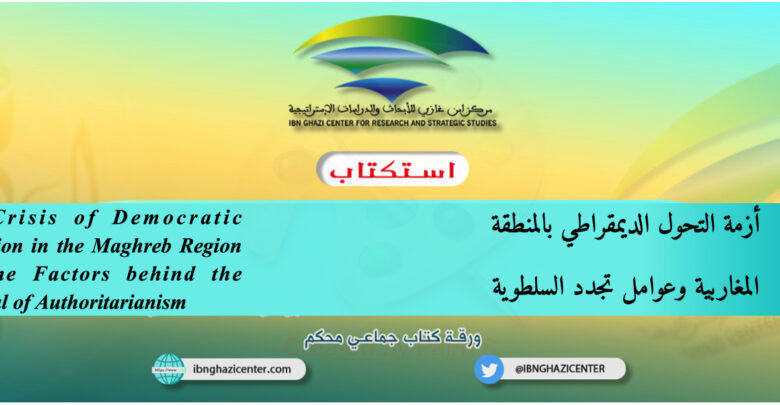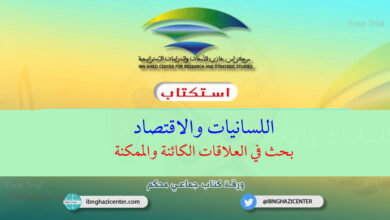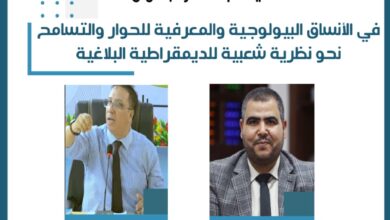استكتاب:أزمة التحول الديمقراطي بالمنطقة المغاربية وعوامل تجدد السلطوية

ديباجة :
شهدت منطقة المغرب العربي بعد عقود من الحكم الاستبدادي والجمود السياسي موجة تحولات سياسية واجتماعية باندلاع احتجاجات شعبية انطلقت شرارتها من دولة تونس أواخر سنة 2010، وانسحبت على باقي دول المنطقة (مصر- ليبيا – المغرب – الجزائر…) سنة 2011، ليتطور الحراك الشعبي ويتجاوز طبيعة الاحتجاجات إلى ثورات وانتفاضات في بعض الدول، مما يعيد رسم الخريطة السياسية بالمنطقة ويعبر عن الإمكانية التاريخية للانتقال من الأنظمة العربية الشمولية والسلطوية إلى الديمقراطية، وقد أسفرت هذه الحركات التغييرية عن مسارات مختلفة للتغيير السياسي في دول المنطقة، فتم إسقاط رأس النظام في كل من تونس ومصر وليبيا، وفرض إصلاحات سياسية ودستورية بكل من المغرب والجزائر.
بعد الحراك المجتمعي الذي عرفته المنطقة، تباينت تجارب الأنظمة السياسية في التفاعل معه، ما بين الاحتواء والتكييف، أو الصراع والانفجار، ليظل المشهد الراهن بعد عقد من الزمن على انطلاق هذه التحولات السياسية والحركات التغييرية يعكس تشبت النظم السياسية العربية بالاستمرار في مواجهة مختلف الضغوط الداعية لإحداث عملية التغيير السياسي، إما بتجديد قواعد البنى السلطوية وتثبيتها، أو بالعنف والقمع المباشر، نتيجة عوامل داخلية ، وأخرى خارجية تعمل على إعاقة عملية التحول نحو الديمقراطية في المجتمعات العربية وترسيخ أنظمة سلطوية تخدم مصالحها في المنطقة، مما زاد من تفاقم الانقسامات الاجتماعية التي تحولت بدورها في بعض الدول إلى صراعات طائفية تهدد استقرار المنطقة برمتها.
في مشروع هذا الكتاب، ومواكبة للحظة التاريخية التي تعيشها المجتمعات العربية منذ بداية الحراك المجتمعي سنة 2011، وما رافقها من إشكالات علمية على المستوى الأكاديمي جعلت من هذا الموضوع ذا أولوية بالغة سواء في حقل العلوم السياسية أو غيره من الحقول المعرفية الأخرى، وعليه ندعو المهتمين بدينامية الانتقال والتغيير السياسي في دول المنطقة المغاربية إلى المشاركة في هذا الكتاب الجماعي الذي يعمل على استجلاء طبيعة التحولات السياسية التي تشهدها المنطقة وانعكاساتها على التحول الديمقراطي وبناء دولة المواطنة، والأسباب والعوامل التي أدت إلى ذلك، وتجليات الاستعصاء الديمقراطي وإعادة تثبيت البنى السلطوية في الوطن العربي، وسيناريوهات المستقبل السياسي بدول المنطقة، وذلك من خلال التساؤلات والمحاور التالية :
ــ ما موقع الثقافة السياسية في الوطن العربي من استعصاء التخلص من السلطوية وبناء الدولة الوطنية الديمقراطية ؟
ـ ما هي العوامل الحقيقية الكامنة وراء اندلاع التحولات السياسية التي عرفتها المنطقة المغاربية ؟
ـ مـا هـي العوامـل والآليات التـي تسـمح للسلطوية المعاصـرة بالتجـدد والاستمرارية ؟
ـ كيف تتجلى الأشكال التــي تتخذهــا النظــم السلطوية المعاصــرة؟ ومــا هــي الخصائــص المشــركة بينهــا؟
ـ لماذا تحوّل الحراك الشعبي العربي من فرصة سياسية إلى أزمة ديمقراطية وصراعات داخلية؟
ـ إلى أي مدى تبرز العوائق الداخلية والخارجية التي عملت على إفشال مسار التحول السياسي في الوطن العربي؟
ـ كيف أدت التحولات السياسية في المنطقة المغاربية إلى إعادة إنتاج السلطوية وتجديد قواعدها ؟
ـ ما هي السيناريوهات المستقبلية المحتملة للتحولات السياسية الجارية بالمنطقة المغاربية في ظل حالة الاحتقان المتواصل؟
ــ مقترحات محاور الكتاب الجماعي:
المحور الأول: أصول وتجليات بنية المنظومة السلطوية في تاريخ الأنظمة السياسية العربية
المحور الثاني: التحولات السياسية في دول المنطقة المغاربية وملامح الاستعصاء الديمقراطي
المحور الثالث: العوامل الدافعة للتحول السياسي بدول المنطقة المغاربية وتحديات المرحلة الانتقالية
المحور الرابع : تجليات البنية السلطوية في دول المنطقة المغاربية و إعادة إنتاجها
المحور الخامس: التجليات السياسية والدستورية للبنية السلطوية في الانظمة السياسية العربية بعد حراك 2011
المحور السادس: مظاهر المضامين السلطوية في المنظومة الحقوقية والحريات العامة بالدول المغاربية بعد 2011
المحور السابع : إعادة إنتاج البنى السلطوية بدول المنطقة المغاربية والسيناريوهات المستقبلية للتغيير السياسي بالمنطقة.
ــ شروط المشاركة :
– أن يكون الموضوع منسجماً مع أحد محاور الورقة الأرضية.
– أن يرسل الباحث الملخص في حدود صفحة واحدة( 200كلمة).
– أن تقدم الأوراق في حدود 15 صفحة مكتوبة بالخط: اللغة العربية في حدود(ما بين 4000 و6000 كلمة)
مقاس14(Simplified Arabic)، واللغات الأجنبية مقاس 14
(Times New Roman)، مع مراعاة مسافة 1,5 بين الأسطر.
– تكتب العناوين الرئيسية بحجم 16 والفرعية بحجم 14 بخط مضغوط( (en gras.
– تكتب الهوامش في آخر البحث بالخط 12.
_ لغات الكتاب الجماعي:
العربية، الإنجليزية، الفرنسية.
مواعيد هامة:
– استقبال الملخصات: إلى نهاية يناير2023.
– الرد على الملخصات المقبولة فقط: ابتداء من15فبراير 2023.
– آخر أجل لاستقبال الأوراق المشاركة كاملة: 30 ابريل 2023 .
– الرد النهائي على الأوراق المقبولة فقط: 20 يونيو 2023.
-ينشر الكتاب إن شاء الله تعالى شهر شتنبر2023.
بريد المراسلة:
Crisetransmaghrib2023@gmail.com
منسق المشروع:
_ عبد اللطيف العسلة
الهيئة العلمية:
_ عباس بوغالم : كلية العلوم القانونية والاقتصادية والاجتماعية، جامعة محمد الأول وجدة.
_ يوسف هركان: كلية العلوم القانونية والاقتصادية والاجتماعية ، جامعة عبد المالك السعدي بتطوان.
_ حفيظ هروس : مركز تكامل للدراسات والابحاث
_ نور الدين الادريسي: كلية العلوم القانونية والاقتصادية والاجتماعية السويسي، جامعة محمد الخامس بالرباط.
_ عبد الرحمان منظور الشعيري: مركز ابن غازي للأبحاث والدراسات الاستراتيجية.
_ محمد الغازي: كلية الآداب و العلوم الانسانية، جامعة ابن زهر بأكادير .
Ibn Ghazi Center for Research and Strategic Studies
Launches a call for paper for a refereed international collective book on:
The Crisis of Democratic Transition in the Maghreb Region and the Factors behind the Renewal of Authoritarianism
Preamble
After decades of authoritarian rule and political stagnation, the Maghreb region witnessed a wave of political and social transformations with the outbreak of popular protests, sparked by the state of Tunisia in late 2010, and spread to the rest of the countries of the region (Egypt – Libya – Morocco – Algeria …) in 2011. These popular movements developed and went beyond casual protests to serious revolutions and uprisings in some countries. The witnessed events have redrawn the political map in the region and expressed the historical possibility of a transition from totalitarian regimes to democratic ones as witnessed in Tunisia, Egypt and Libya. Likewise, what happened in Morocco and Algeria has also imposed political and constitutional reforms.
After these societal movements in the region, the experiences of the political regimes varied in their reaction to it: in some countries, the upraising was absorbed or adapted; in others it triggered conflicts and disputes. A decade after these political transformations began, the current scene reflects the Arab political systems’ tenacity to continue facing the various pressures calling for events. The process of political change, either by renewing and consolidating the rules of authoritarian structures, or by violence and direct repression, as a result of internal and external factors that impede the process of transition towards democracy in Arab societies and the consolidation of authoritarian regimes that serve their interests in the region. This situation has exacerbated the social divisions that in turn led some countries to burst into sectarian conflicts threatening the stability of the entire region.
The objective of this collective book is to keep pace with the historical moment experienced by Arab societies since the beginning of their societal movement in 2011. It also seeks to achieve a scientific investigation to the problems raised at the academic level whether in the field of political science or other fields of inquiry. Accordingly, we invite every researcher interested in political dynamism, democratic transition, and political change in the countries of the Maghreb region to participate in this collective book which seeks to clarify the nature of the political transformations taking place in the region. It also aims to investigate its repercussions on democratic transformation, the building of the state of citizenship, and the reasons and factors that triggered all those popular protests. In other words, the book intends to discuss the manifestations of democratic intransigence, the re-establishment of authoritarian structures in the Arab world, and scenarios the political future in the countries of the region through the following questions:
– What is the position of the political culture in the Arab world regarding the intractability of getting rid of authoritarianism and building a democratic national state?
– What are the real factors underlying the outbreak of the political transformations that the Maghreb region experienced?
– What are the factors and mechanisms that allow contemporary authoritarianism to renew and continue?
– How are the forms taken by contemporary authoritarian regimes manifested? And what are their common characteristics?
– Why was the Arab political and social popular movement transformed from a political opportunity into a democratic crisis and internal conflicts?
– To what extent do the internal and external obstacles contributed to thwarting the course of political transformation in the Arab world?
– How did the political transformations in the Maghreb region lead to the reproduction of authoritarianism and the renewal of its foundations?
– What are the possible future scenarios for the political transformations that would take place in the Maghreb region given the actual state of continuous tension?
The suggested topics are as follows:The origins and manifestations of the structure of the authoritarian system in the history of Arab political systems
The political transformations in the countries of the Maghreb region and the features of democratic intransigence.
The factors driving political transformation in the countries of the Maghreb region and the challenges of the transitional period
The manifestations of the authoritarian structure in the countries of the Maghreb region and its reproduction
The political and constitutional manifestations of the authoritarian structure in the Arab political regimes after the 2011 movement
The manifestations of authoritarian contents in the Human Rights system and public freedoms in the Maghreb countries after 2011.
Reproducing the authoritarian structures in the countries of the Maghreb and future scenarios for political change in the region.
Participation Conditions:
The topic should be consistent with at least one of the topics of this call for paper.
The abstract should not go beyond one page (200 words).
Papers written in foreign languages should be size 14; (Times New Roman), with 1.5 interline spacing.
The main headings should be written in size 16 and the subheadings in size 14 in bold font.
Use endnotes at the end of the paper size 12.
Languages: Arabic English French.
- Important Dates:
- Abstracts submission deadline: until the end of January 2023.
- Notification of abstracts acceptance: starting from February 15, 2023.
- Full papers submission deadline: April 30, 2023.
- Notification of final paper acceptance: June 20, 2023.
- The book publication is due to, September 2023, God willing.
Correspondance email : Crisetransmaghrib2023@gmail.com
Coordinator: Abdul Latif Al-Asla
:scientific Committee
Abass Bouralem_ Youssef Harkan_ Abdel Hafid Harouss_ Nour dine El Idrisi_ Abderrahman Mandour Echairi_ Mohamed Elghazi






